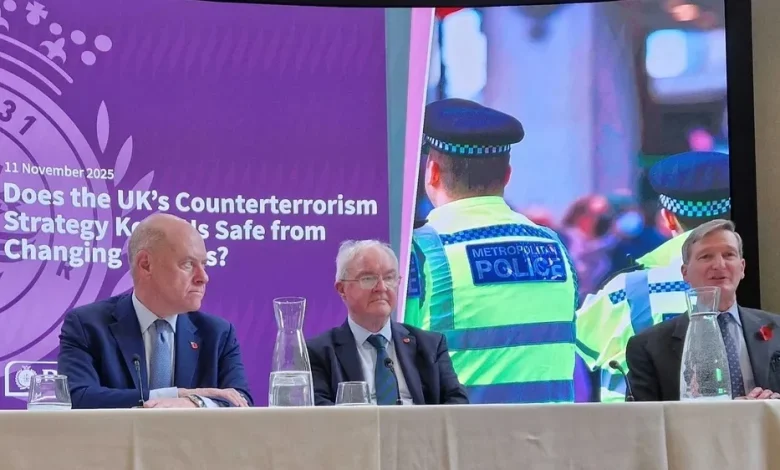Former Northern Ireland lord chief justice says UK wrong to strip Shamima Begum of citizenship

Sir Declan Morgan, the lord chief justice of Ireland between 2009 and 2021, has told Middle East Eye that Britain should not have stripped Shamima Begum of her citizenship.
Morgan, a supplementary panel member of the UK Supreme Court, made the remarks on Tuesday afternoon at the launch of a new report by the Independent Commission on UK Counter-Terrorism Law, Policy and Practice, which he chairs. The launch was hosted by the Royal United Services Institute (Rusi) in Westminster.
The report, which comes after a three-year review, makes extensive criticisms of British counter-terror legislation, including that the practice of citizenship deprivation disproportionately affects British ethnic minorities.
Begum, a London-born woman who travelled to Islamic State-controlled territory aged 15 in 2015 and remains in a detention camp in northeast Syria, was stripped of her British citizenship under the previous Conservative government in 2019.
Begum’s legal team argued in the Supreme Court last year that the decision was unlawful, arguing that authorities had failed to stop her being trafficked, but the court refused to hear her appeal.
New MEE newsletter: Jerusalem Dispatch
Sign up to get the latest insights and analysis on
Israel-Palestine, alongside Turkey Unpacked and other MEE newsletters
Asked by MEE to comment on Begum’s case specifically, Morgan said that “under our proposals [citizenship] could not be taken from her”.
He added that the government “should do what we [the commission] recommend in terms of the way that they approach it. They should be looking at understanding their responsibilities.”
Morgan said the government’s current approach is “unsustainable and inconsistent with our human rights obligations”, urging the “repatriation of British nationals including of dual citizenship”.
‘Unequal protection among British citizens’
The commission’s report says that over the past two decades “the threshold for [citizenship] deprivation has been steadily lowered, and procedural protections have weakened”.
It adds: “Evidence from practitioners and researchers indicates that race, belonging, and identity shape the application of deprivation powers.
“Although the law prohibits statelessness, in practice deprivation may proceed where another nationality is merely presumed.
Shamima Begum loses appeal against British citizenship deprivation
Read More »
“This results in unequal protection among British citizens, as only those with actual or potential claims to another nationality are vulnerable to deprivation – disproportionately affecting minority ethnic communities.”
The British government argues that Begum, born in the UK, is entitled to Bangladeshi citizenship through her parents.
However, Bangladeshi authorities have rejected claims that she is a Bangladeshi national.
The report recommends that citizenship should not be revoked from anyone born with British citizenship, or from children registered as British.
The report futher criticises that the home secretary can strip someone of British citizenship if it is deemed “conducive to the public good”, arguing this “leaves the UK open to accusations that deprivation criteria are arbitrary”.
It says the British approach to the issue of repatriating citizens from conflict zones like Syria makes the country an “outlier”.
‘Several women were also children when they departed the UK with their families, and therefore could be considered victims of human trafficking’
– Independent Commission report
“Several women were also children when they departed the UK with their families, and therefore could be considered victims of human trafficking.”
Begum was 15 when she left Britain.
Former attorney general and Conservative politician Dominic Grieve, a commission member, noted that “the US, Canada and Australia” have all managed to repatriate many of their citizens from conflict zones.
“The UK really stands out as the one country refusing to do this,” he said at the launch event.
The report also calls for the UK’s definition of terrorism to be tightened, saying that “without careful calibration, counterterrorism powers risk being applied too broadly – capturing behaviour that is harmful but not terrorist”.
Jonathan Hall, the independent reviewer of terrorism legislation, told MEE: “This is a far reaching and impressive document that is not full of wafty generalities but shows a real commitment to making practical recommendations.”





